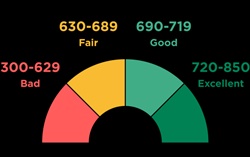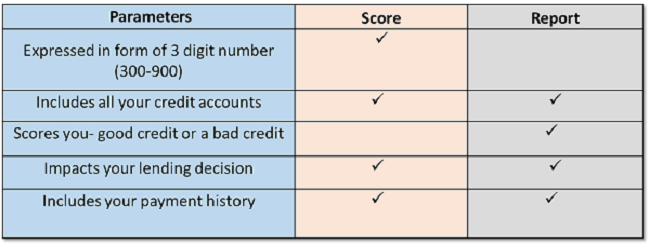
Table of Contents
What is a Good Credit?
Good credit is a credit rating that indicates a borrower's Credit Score is above average and that they are a low credit risk. To put it in other words, it indicates the paying back capacity of the borrower.

These ratings are given by credit reporting organisations. These scores are then used to make credit underwriting decisions and to get information about a person's background by lenders. Credit scores differ depending on the techniques used to calculate them. The CIBIL Score is the most widely utilised credit score.
Why is Good Credit Important?
Good credit is crucial in achieving financial and personal objectives more easily. It can mean the difference between getting a home mortgage or a vehicle loan and not getting one. If you're accepted, it can have a direct influence on how much interest or fees you'll have to pay. Here are a few points listed down for better understanding:
- The credit score of an individual is crucial in evaluating his or her creditworthiness. It helps the lender (Banks or a non-banking financial institution) to assess a potential borrower's capacity to pay back.
- It also has an influence on the loan amount sanctioned as well as the interest rate the borrower will pay on loan. Furthermore, a lender may reject a loan application if the borrower has a poor credit score.
What is a Good Credit Score in India?
A credit score is a three-digit figure that indicates an individual's creditworthiness. It usually lies between 300 to 900 points, with 900 being the maximum attainable score. TransUnion CIBIL, one of India's four Credit Bureaus, is responsible for calculating this score (other bureaus include Experian, CRIF High Mark and Equifax).
A credit score closer to 900 is more likely to make your loan application be accepted, according to TransUnion CIBIL's website. In India, a credit score equivalent to 750 is generally regarded as a good credit score.
Talk to our investment specialist
Ways to Improve Credit Score
Focus on the fundamental issues that impact your credit ratings to increase your credit scores. A few ways to improve the credit score are as follow:
1. On-Time Payment of Dues
Ensuring timely and consistent payment of dues such as credit card bills, EMIs is commonly regarded to receive the most weightage among all the factors weighed in by credit agencies (such as CIBIL) when computing the credit score. As a result, timely loan and credit card repayment is the first step in consistently increasing or maintaining one's credit score.
2. Maintain a Low Credit Card Balance
The current amount and Credit Limit of revolving accounts such as credit cards are compared in your credit usage rate, which is an essential scoring component. Your credit score can be improved by having a low credit use rate. The overall utilisation rate of those with good credit ratings is often in the single digits.
3. Keep Outdated Credit Cards
If you've had a credit card with a certain issuer for a while and have been timely paying all of the bills, there are more chances that your issuer will encourage you to cancel the existing card and apply for a new one, with enticing incentives. It’s important that you avoid it at any cost.
4. Review Credit Reports
Credit bureaus typically use the information given by lenders and credit card issuers to construct credit scores. Any incorrect information on credit reports, whether due to lender/card issuer clerical errors or any fraud transactions, be it in borrower’s name or in the name of cardholder, may have a negative influence on the credit score. The only way to catch such errors is to get and analyse credit reports on a regular Basis. As a result, customers should get their credit reports at least once a year from the credit agencies.
All efforts have been made to ensure the information provided here is accurate. However, no guarantees are made regarding correctness of data. Please verify with scheme information document before making any investment.












